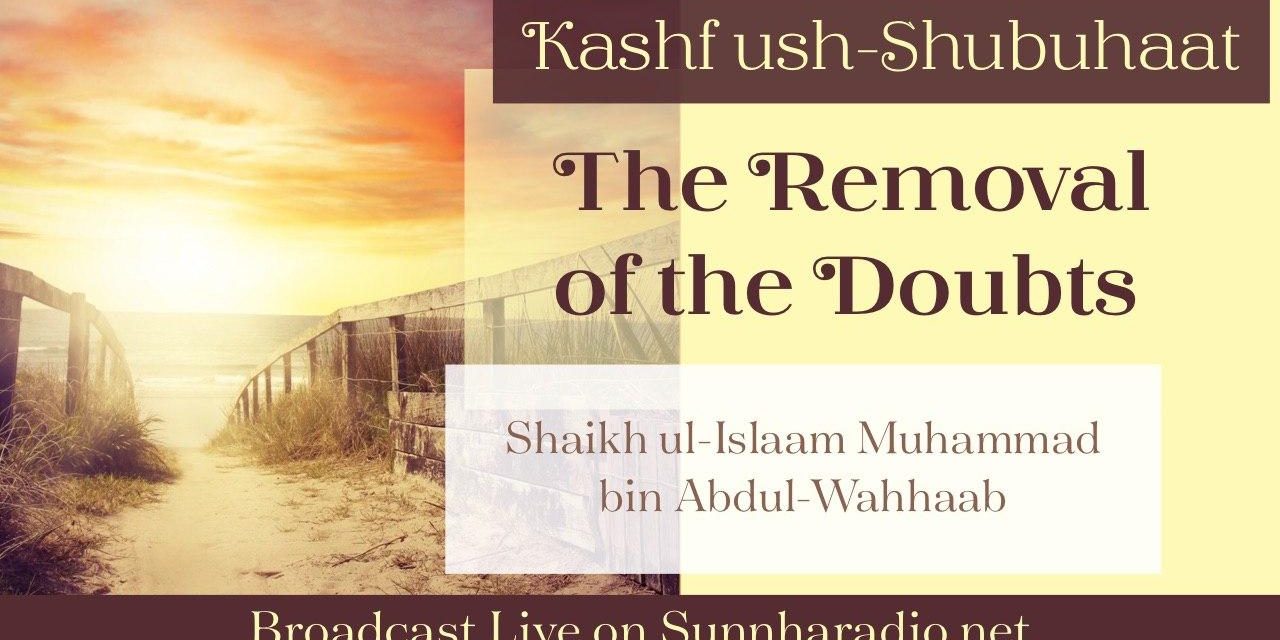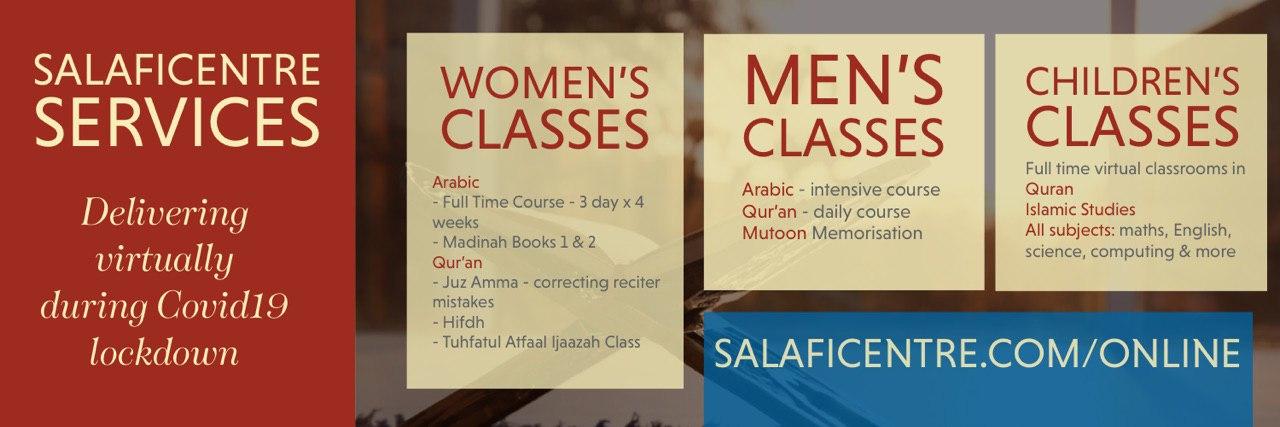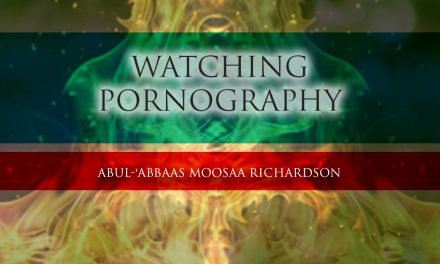Recordings of the weekly lesson from Kashf ush-Shubuhaat – the book of Shaykhul Islaam Mohammed ibn Abdul Wahaab (rahimahullah).
“Know – may Allaah have mercy upon you – that tawheed is to single out Allaah – free is He from all imperfections – with (all matters of) worship. And this is the religion of the Messengers sent by Allaah to His servants.”
Notes
-
Lesson 1
Kashf ush-Shubuhaat – The removal of the doubts – Lesson 01 (29/02/20) The biography of Shaykh Mohammed ibn Abdul Wahaab Today’s lesson was an Introduction into the book which is written by Shaykh Al-Fawzan. Shaykh Al-Fawzan said. “Before we begin the actual book, we will speak about the author. So, the student of knowledge has an actual understanding of who the scholars are.” Today we covered: •Shaykh Mohammed ibn Abdul Wahaab was born in the area of Ul-Uwaynah in the year 1115 Hijri. It is the North of the city of Riyadh. •Shaykh Mohammed ibn Abdul Wahaab was raised in a household of knowledge oHis father was the judge of the area oHis grandfather, Suleman was the mufti and the scholars would return back to. oHis paternal uncles were all known of people of knowledge •From a young age Shaykh Mohammed ibn Abdul Wahaab was studying learning from his own father and uncles •He memorised the whole of the Qu’raan before the age of 10 years old from his father. •At a young age he was reading into the books of hadith and tasfeer. He had a good level of understanding and knowledge at a very young age. •His father and the other scholars were amazed at his level of ability •He used to engage in conversations with them to the extent that the elders would benefit from him. •Even after taking from his father and uncles he was still not content. He then travelled out for knowledge. It was known from the salaf that they would study with the scholars in their region. Then after taking from the local scholars they would travel out and seek scholars in other areas. •He then travelled to go and preform Hajj. After Hajj he went to Madinah and met with the scholars in the Prophets ﷺ mosque. •The Shaykh even went to Basara - Iraq to seek knowledge and benefit from the scholars there. •After all of his travelling he intended to go to Shaam and benefit from more of the Scholars. However, as he made his way to Shaam he was about to die as he ran out of food and drink. So, he then returned back to Basra and equipped himself with more knowledge. •It was at this point when the Shaykh began his time in giving dawah. •When he returned to his homeland, he saw the evil which was being committed. He considered that he cannot stay silent whilst this evil was taking place. •The scholars of the area at that time were mostly focused on issues of fiqh, not aqeedah. •As for the aqeedah of the salaf there were very few that were focusing on that. •Many of the people were given in by the Bid’ah and Shirk they were upon. Many of them were grave worshippers, seeking intercession with the dead. They used to ask from the trees as they believed that they had Barakah in them. •When he saw the state of the muslims he was inclined to give dawah to the people •The books of Shaykh Mohammed ibn Abdul Wahaab – He wrote many books. The greatest of them. oKitaab At Tawhid – The right of Allaah upon his Servants oKashf ash-Shubuhaat •There were many people who were against the Shaykh and some of the people made so called refutations of the Shaykh. •The Shaykh clarified all of there refutations and hence made the book – Kashf ash-Shubuhaat. •Ustaadh Taqweem explains and gives a definition of the word – Doubt. Kashf means to expose those doubts and to separate those doubts. To remove the covering of something to expose it. Recorded at the Salafi Centre of Manchester on 29/02/20 and streamed live on www.SunnahRadio.Net
-
Lesson 2
Kashf ush-Shubuhaat – The removal of the doubts – Lesson 02 (07/03/20) Introduction to the book. In the Name of Allāh, the Most Merciful, the Bestower of Mercy Know — may Allāh have mercy upon you — that Tawhīd (Islāmic monotheism) is to single out Allāh (وتعاىل سبحانه (alone with all worship. It is the Religion of all of the Messengers whom Allāh has sent to His servants. The first of them was Nūh (السالم عليه .(Allāh sent him to his people after they began to exaggerate in their reverence towards the righteous people: Wadd, Suwā', Yagūth, Ya’ūq and Nasr. The last of the Messengers was Muhammad (صلى الله عليه وسلم ,(and he is the one who destroyed the depictions of these righteous men. Today we covered: •The basmallah oAll of the chapters of the Qu’raan start with the basmallah oIt is from the sunnah that when the Prophet ﷺ would send a letter to the people inviting them to Islam, he would always start with the basmallah oThe Scholars would always start their books with the basmallah oI seek aid and assistance from Allaah, in whatever you are going to do oAllaah is known as the greatest name of Allaah – The one who is worshipped oAr Rahman Ar Raheem – these are the names of Allaah and from them comes mercy oAllaah has more than 99 names – The Prophet ﷺ has told us in a hadeeth that He has more than 99 names. •An introduction from Shaykh Muhammad ibn Abdul Wahhab oHave knowledge of this book and may Allaah have mercy upon you oTawhid is to single out Allaah alone with worship -Tawhid Al – Uloohiyyah (Worship) -Tawhid it is to single Allaah in all forms of worship. -Tawhid Ar Rububiyyah (Lordship)– Allaah is the only true creator, sustainer, planner and the only one that gives life and death of all that exits. -Tawhid al Asma Was Sifaat (The names and attributes of Allaah) – To believe and affirm to the names and attributes of Allaah taught to us in the Qu’raan and the authentic sunnah o Tawhid is the religion of all of the messengers that were sent by Allaah. oNuh was the first of the Messengers to be sent with the call of worshipping Allaah alone •Q&A session Recorded at the Salafi Centre of Manchester on 07/03/20 and streamed live on www.SunnahRadio.Net
-
Lesson 3
Kashf ush-Shubuhaat – The removal of the doubts – Lesson 03 (14/03/20) In the Name of Allāh, the Most Merciful, the Bestower of Mercy The first of them was Nūh (السالم عليه .(Allāh sent him to his people after they began to exaggerate in their reverence towards the righteous people: Wadd, Suwā', Yagūth, Ya’ūq and Nasr. The last of the Messengers was Muhammad (صلى الله عليه وسلم ,(and he is the one who destroyed the depictions of these righteous men. Allāh sent him to a people who used to worship, perform pilgrimage, offer charity, and they would remember Allāh often. But these people used to make some sort of the creation as intermediaries between them and Allāh. They would say: “We only desire from them that they bring us closer to Allāh. We only seek their intercession with Allāh.” They used to seek this from the likes of the Angels, ‘Īsā (السالم عليه ,(Maryam and other than them from the people of righteousness. Today we covered: •The evidences in the Qur’aan that affirm the categories of Tahwid •The whole book is in refutation of people who say that we can call upon 3rd party entities •How the categories of Tawhid connected •How shirk first began oAt the time of the people of Prophet Nuh, there were righteous people that lived in that 10th generation. oWhen they died the community were left grieving, in a state of loss. oShaytaan, for the first time in 10 generation he saw an opportunity to exploit the people at their loss. oThe shaytaan came to the people and reminded them of the righteous people and suggested that they should go to their graves so that you can be reminded how righteous they were and could build your eemaan. oShaytaan then mentioned that they should stay there for hours at a time to remember how pious they were. So the people starting to do as he suggested. oShaytaan then encouraged the people to make some figurines/ representations of them in your villages and gathering places. So that you can see them and remember and reflect. oShaytaan then waited for years to pass and came to the people again. He explained to them that the idols were made by their forefathers and they should worship them. So the people started to worship the idols and this is where shirk began. •The conditions of being a companion Recorded at the Salafi Centre of Manchester on 14/03/20 and streamed live on www.SunnahRadio.Net
-
Lesson 4
Kashf ush-Shubuhaat – The removal of the doubts – Lesson 04 (08/08/20) Today we covered: •Words of advice from Ustaadh Taqweem regarding the affairs of Covid-19 •A small recap into what has already been covered oThis book was written as a refutation against those people who worshipped the graves oThis book is a list of evidences refuting the people of shirk •The shaykh always starts his books with a du’aa for the people as he wants good for them. •“Know that tawhid is to single out Allaah alone in all acts of worship” oWe affirm all worship for Allaah alone and we negate worship to anyone/anything else. oAllaah sent all the Prophets and messengers with the same message, with the message of Tawhid. o“And I did not create the Jinn and the humans except that they worship Me alone.” Soorah Daariyaat ayah 36 oThe first of the messengers was Nuh. Allaah sent Nuh to his people when they exaggerated with their righteous ie. Wadd, Suwa, Yaguth oWhen their righteous died the people were at loss and that is when shaytaan came and misguided the people. o Shaytaan, for the first time in 10 generation he saw an opportunity to exploit the people at their loss. oThe shaytaan came to the people and reminded them of the righteous people and suggested that they should go to their graves so that you can be reminded how righteous they were and could build your eemaan. oShaytaan then mentioned that they should stay there for hours at a time to remember how pious they were. So the people starting to do as he suggested. oShaytaan then encouraged the people to make some figurines/ representations of them in your villages and gathering places. So that you can see them and remember and reflect. oShaytaan then waited for years to pass and came to the people again. He explained to them that the idols were made by their forefathers and they should worship them. So the people started to worship the idols and this is where shirk began. •The Prophet ﷺ was sent to a people who used to worship and do Hajj, give in charity, and remember Allaah etc. However, they would make some of the creation as intercessors for their worship. •The Quraysh used to honour the Ka’ba but they would love their pious ones making them equal to Allaah, upon shirk. •They would make these intermediaries and intercessors alongside Allaah. •They would say, “We only want from them closeness to Allaah.” •So Allaah sent Prophet Muhammad ﷺ to revive the religion of Ibrahim, the religion of Tawhid, the religion of all the Prophets and messengers. •Q&A session Recorded at the Salafi Centre of Manchester on 08/08/20 and streamed live on www.SunnahRadio.Net
-
Lesson 5
Kashf ush-Shubuhaat – The removal of the doubts – Lesson 05 (15/08/20) Allāh sent him to a people who used to worship, perform pilgrimage, offer charity, and they would remember Allāh often. But these people used to make some sort of the creation as intermediaries between them and Allāh. They would say: “We only desire from them that they bring us closer to Allāh. We only seek their intercession with Allāh.” They used to seek this from the likes of the Angels, ‘Īsā (السالم عليه ,(Maryam and other than them from the people of righteousness. Today we covered: •The linguistic meaning of Shafa’ah •The mushrikoon at the time of the Prophet ﷺ used to use intermediaries to send their du’aas to Allaah •The mushrikoon used to think that they were not good enough to make du’aa and that they needed intermediaries •Many of their idols and statues were actual graves of pious people •The mushrikoon used to testify that Allaah is the creator, Him alone without any partners, and they used to testify that nobody provides and sustains us except Allaah. •The meaning of the Shahaadah •The categories of Tawhid and its definition •Q&A session Recorded at the Salafi Centre of Manchester on 15/08/20 and streamed live on www.SunnahRadio.Net
-
Lesson 6
Kashf ush-Shubuhaat – The removal of the doubts – Lesson 06 (22/08/20) Allāh sent him to a people who used to worship, perform pilgrimage, offer charity, and they would remember Allāh often. But these people used to make some sort of the creation as intermediaries between them and Allāh. They would say: “We only desire from them that they bring us closer to Allāh. We only seek their intercession with Allāh.” They used to seek this from the likes of the Angels, ‘Īsā (السالم عليه ,(Maryam and other than them from the people of righteousness. Today we covered: •A continuation of last weeks lesson oAr-Rubbubiyyah is not sufficient enough to enter into Islam oAl-Uloohiyyah is a must to actualise the fruits of Tawhid oThe Messenger ﷺ fought them upon the basis of shirk they were upon oThose who call upon the deceased in their graves oThe best times to make du’aa oThe closest a person is to his Lord is when he is in prostration oAl-Uloohiyyah is the meaning of the testification •Q&A session Recorded at the Salafi Centre of Manchester on 22/08/20 and streamed live on www.SunnahRadio.Net
-
Lesson 7
Kashf ush-Shubuhaat – The removal of the doubts – Lesson 7 (05/09/20) Even though these polytheists used to bear witness that Allāh is the sole creator with no partners; that no one provides for the creation other than Him; none grants life except Him; and none brings about death except Him. [They also believed that] none has any share in disposing the affairs of the creation other than Him; and that the seven heavens and the seven earths, and what is contained therein, all of it is subservient to Him and subject to His authority and overwhelming control. Today we covered: •It is not sufficient that a person can just say the Shahaadah. The shahaadah is of 3 things: oTo say it oTo understand the meaning oTo act upon it •The fadal of Allaah is Islam •The Rahma of Allaah is the Qu’raan •Indeed the religion of Islam is from Allaah •The du’aa of Prophet Ibrahim •The du’aa of the Prophet ﷺ •Q&A session Recorded at the Salafi Centre of Manchester on 05/09/20 and streamed live on www.SunnahRadio.Net
-
Lesson 8
Kashf ush-Shubuhaat – The removal of the doubts – Lesson 8 (12/09/20) Even though these polytheists used to bear witness that Allāh is the sole creator with no partners; that no one provides for the creation other than Him; none grants life except Him; and none brings about death except Him. [They also believed that] none has any share in disposing the affairs of the creation other than Him; and that the seven heavens and the seven earths, and what is contained therein, all of it is subservient to Him and subject to His authority and overwhelming control. Today we covered: • The importance of staying away from the people of innovation • Q&A session Recorded at the Salafi Centre of Manchester on 12/09/20 and streamed live on www.SunnahRadio.Net
-
Lesson 9
Kashf ush-Shubuhaat – The removal of the doubts – Lesson 9 (19/09/20) Examples of this is if a polytheist was to say to you [as doubts for his polytheism]: • [The verse]: “Surely for the awliyā’ of Allāh there will be no fear; nor will they grieve.” [Sūrah Yūnus 10:62] • Or that certainly the intercession is true and the Prophets possess a truly lofty station with Allāh. • Or when they cite some speech of the Prophet (صلى الله عليه وسلم (seeking to use it in support of their falsehood and you cannot understand the meaning of his speech. Then respond to his statement [with a general response] by saying: “Indeed Allāh has mentioned that the people whose hearts have deviated abandon the clear texts in order to follow the ambiguous texts. And what I have mentioned to you, showing that Allāh has informed that the polytheists affirm alRubūbiyyah and yet their disbelief occurred due to their devotion to the Angels, Prophets, and awliyā’. And that they justified their actions by saying: “They are our intercessors before Allāh,” [Sūrah Yūnus 10:18] and this is something indisputable for which no one can attempt to distort its meaning. Today we covered: • The importance of staying away from the people of innovation • The eyesight’s cannot encompass and comprehend Allaah • We cannot see Allaah in this world, but we will see Him in the hereafter • The importance of having a sound aqeedah • Q&A session Recorded at the Salafi Centre of Manchester on 19/09/20 and streamed live on www.SunnahRadio.Net
-
Lesson 10
Kashf ush-Shubuhaat – The removal of the doubts – Lesson 10 (26/09/20) 1st DOUBT — The claim that the one who acknowledges Tawhīd ar-Rubūbiyyah and only intends intercession from the righteous is not a Mushrik From their statements is their saying that: “We do not make Shirk with Allāh rather we bear witness that no one creates or sustains; or can benefit or harm except Allāh alone with no partners. And Muhammad (صلى الله عليه وسلم (cannot even bring about benefit or harm to himself, so how much more so ‘Abd alQādir or other than him? But I am sinful, and the righteous possess a lofty station with Allāh, so I beseech Allāh by way of them.” So answer him with the response that has already preceded and this is that those people whom the Messenger of Allāh (صلى الله عليه وسلم (fought against used to affirm all what you have mentioned. They used to admit that their idols did not control anything and that they only turned to them for their lofty station and for their intercession. Then recite for him what Allāh mentions in His Book and further clarifies. 2nd DOUBT — The claim that worshipping other than Allah only occurs in worshipping idols and NOT with the righteous Today we covered: • The first Doubt: • The mushrikoon used to say, “We do not commit shirk alongside Allaah.” • They used to affirm the ar-Rububiyyah of Allaah • The intercession of the mushrikoon • Soorah yunis ayah 31 “Say to them, who sustains them and provides for them. Who is the one that brings life after death, surely they will say Allaah.” • Tawhid is not just restricted to just ar-Rububiyyah • Q&A session Recorded at the Salafi Centre of Manchester on 26/09/20 and streamed live on www.SunnahRadio.Net
-
Lesson 11
Kashf ush-Shubuhaat – The removal of the doubts – Lesson 11 (03/10/20) 2 nd DOUBT — The claim that worshipping other than Allah only occurs when worshipping idols and NOT with the righteous Then if he says: “These āyāt were revealed concerning people who worshipped idols, so how can you make the righteous like the idols?”, then respond to him as we have already mentioned. If he accepts that the disbelievers affirmed Rubūbiyyah (Allāh’s Lordship) for Allāh alone and that they only desired the intercession of those whom they turned to – but he desires to distinguish between his own actions and the actions of the disbelievers with what he has mentioned – then mention to him that amongst the disbelievers were those who called upon idols and those who called upon awliyā’, as Allāh says concerning them: 3 rd DOUBT — The claim that seeking intercession (of the dead) is not Shirk If he then says: “The disbelievers seek to benefit from them while I bear witness that only Allāh is the One who gives benefit and harm and He is the disposer of affairs. I do not desire any benefit from anyone besides Him. And I know that the righteous have no share in this, but I turn to them in hope that Allāh will accept their intercession.” 4 th DOUBT — The claim that they do not worship the deceased righteous – despite the fact that they call upon them or sacrifice for them Today we covered: • Prophet Easa will declare his innocence on the day of Judgement and he will highlight that he did not tell the people to worship him • The definition of taghoot • The mushrikoon did not just worship the idols, they called upon the dead also. • So the response to this is – “This is exactly the same statement as the disbelievers, then recite for him the statement of Allāh (وتعاىل تبارك” :(And those who take protectors besides Him say: We only worship them that they may bring us nearer to Allāh in position.” [Sūrah al-Zumar 39:3] • And there is the statement of Allāh (وتعاىل تبارك” :(They are our intercessors before Allāh.” [Sūrah Yūnus 10:18]” • Know that these three doubts are the strongest evidences they possess. So if you know that Allāh has clarified this issue in His Book and you have understood this matter well, then whatever follows after this will be easier. • The definition of intercession • Q&A session Recorded at the Salafi Centre of Manchester on 03/10/20 and streamed live on www.SunnahRadio.Net
-
Lesson 13
Kashf ush-Shubuhaat – The removal of the doubts – Lesson 13 (17/10/20) 5 th DOUBT — The claim that the one who rejects Shirk has rejected the intercession of the Messenger (صلى الله عليه وسلم( Then if he says: "Do you reject the intercession of the Messenger of Allāh (صلى الله عليه وسلم (and have you forsaken it?" Say to him: "I do not reject it nor have I abandoned it. Rather, he (صلى الله عليه وسلم (is the intercessor whose intercession will sought and granted – and I truly hope for his intercession – but all intercession is for Allāh as He (وتعاىل تبارك (says: "To Allāh belongs all intercession." [Sūrah al-Zumar 39:44] And it will not occur except with Allāh's permission as He (وجل عز (says: "Who is it that can intercede with Him except by His permission?" [Sūrah al-Baqarah 2:255] And he (صلى الله عليه وسلم (will not intercede on anyone's behalf until Allāh has permitted him, as Allāh (وجل عز (says: "And they cannot intercede except for one with whom He is pleased." [Sūrah al-Anbiyā’ 21:28] And He is not pleased with anything other than Tawḥīd, as Allāh (وتعاىل تبارك (says: "Whoever desires other than Islām as a Religion then this will not be accepted from him." [Sūrah Āli-’Imrān 3:85] So if all intercession is for Allāh; and this will only occur after He has first permitted it; and neither the Prophet (صلى الله عليه وسلم (nor anyone else can intercede on behalf of anyone unless Allāh permits; and since He does not permit this except for the people of Tawḥīd – it should become clear that all intercession is for Allāh so I seek it from Him. So I say: 'O Allāh, do not deprive me of his intercession; O Allāh let him intercede on my behalf and whatever is similar to this.'" Today we covered: • Is it permissible to make du’aa at the grave of the Prophet ﷺ? • What the people will say on the day of judgement • The intercession of the different types of people • Q&A session
-
Lesson 14
Kashf ush-Shubuhaat – The removal of the doubts – Lesson 14 (31/10/20) 5th DOUBT — The claim that the one who rejects Shirk has rejected the intercession of the Messenger (صلى الله عليه وسلم( Then if he says: "Do you reject the intercession of the Messenger of Allāh (صلى الله عليه وسلم (and have you forsaken it?" Say to him: "I do not reject it nor have I abandoned it. Rather, he (صلى الله عليه وسلم (is the intercessor whose intercession will sought and granted – and I truly hope for his intercession – but all intercession is for Allāh as He (وتعاىل تبارك (says: "To Allāh belongs all intercession." [Sūrah al-Zumar 39:44] And it will not occur except with Allāh's permission as He (وجل عز (says: "Who is it that can intercede with Him except by His permission?" [Sūrah al-Baqarah 2:255] And he (صلى الله عليه وسلم (will not intercede on anyone's behalf until Allāh has permitted him, as Allāh (وجل عز (says: "And they cannot intercede except for one with whom He is pleased." [Sūrah al-Anbiyā’ 21:28] And He is not pleased with anything other than Tawḥīd, as Allāh (وتعاىل تبارك (says: "Whoever desires other than Islām as a Religion then this will not be accepted from him." [Sūrah Āli-’Imrān 3:85] So if all intercession is for Allāh; and this will only occur after He has first permitted it; and neither the Prophet (صلى الله عليه وسلم (nor anyone else can intercede on behalf of anyone unless Allāh permits; and since He does not permit this except for the people of Tawḥīd – it should become clear that all intercession is for Allāh so I seek it from Him. So I say: 'O Allāh, do not deprive me of his intercession; O Allāh let him intercede on my behalf and whatever is similar to this.'" 6th DOUBT – The claim that the Prophet (صلى الله عليه وسلم (was given intercession and we are simply seeking that But if he says: "The Prophet (صلى الله عليه وسلم (was granted intercession and I seek it from the one it was given to". Then the response to this is that: “Allāh granted him the right of intercession but prohibited you from this action, as He said: ‘So do not invoke anyone along with Allāh.’ [Sūrah al-Jinn 72:18] So if you call upon Allāh to request that He permit His Prophet to intercede on your behalf then obey him when he said: ‘So do not invoke anyone along with Allāh.’” [Another response to this is that]: “Indeed, intercession has been granted to other than the Prophet (صلى الله عليه وسلم (as well. It has been authentically established that the Angels will intercede, the awliyā’ and the afrāt will intercede. So are you saying that since Allāh has granted these people the ability to intercede, then I should seek it from them? If you are saying this then you have returned to the worship of the righteous people, which Allāh mentioned in His Book. But if you say no, then you have invalidated your claim – that ‘Allāh has granted him intercession then I will seek it from whomever Allāh has granted it.’" Today we covered: • Is it permissible to make du’aa at the grave of the Prophet ﷺ? • What the people will say on the day of judgement • The intercession of the different types of people • It is not permissible to call upon the Angels and the righteous • Q&A session
-
Lesson 15
Kashf ush-Shubuhaat – The removal of the doubts – Lesson 15 (12/12/20) 8th DOUBT – Their claim: “Shirk is worshipping idols but we do not worship idols” If he says: “Shirk is the worship of idols and we do not worship idols.” Then say to him: “What does it mean to worship idols? Do you think that they believe that these idols – made from wood and stone – create, sustain, and regulate the affairs of those who call upon them? This is an understanding that the Qur’ān denies and rejects.” And if he says: “They turn in devotion – to wood, stone, or a building erected upon a grave, or other than this – by calling upon them and sacrificing to them while saying that this practice brings us closer to Allāh in station. And so that Allāh repels from us any harm due to its blessing or grants us our requests due to its blessing.” Then say: “You have spoken the truth – and this is exactly what you do with stones and buildings erected upon graves and other places.” So, this person has admitted that their practices are indeed worship of idols, which is what we were trying to establish. It is also said to him: “As for your statement that Shirk is the worship of idols, do you mean by this to restrict Shirk to this alone and do you believe that relying upon the righteous and supplicating to them is not considered to be Shirk?” This notion is refuted by what Allāh mentions in His Book regarding the disbelief of whoever attaches themselves to and directs worship to the Angels, ‘Īsā or the righteous. So it is incumbent upon him to admit to you that whoever makes one of the righteous to share in the worship of Allāh has indeed committed Shirk, and that this is the Shirk mentioned in the Qur’ān, and this is what we have been seeking to establish. Today we covered: • What is the meaning of worshipping idols • The mushrikoon did not used to believe that their idols could control the affairs and give sustenance. • They would say,”This brings us closer to Allaah.” • They would believe that going to the idols would be just an intermediary between them and Allaah • Even if this same practise of going to the dead was done to the Prophet ﷺ this would also be deemed as shirk • Q&A session
-
Lesson 16
Kashf ush-Shubuhaat – The removal of the doubts – Lesson 16 (19/12/20) 8th DOUBT – Their claim: “Shirk is worshipping idols but we do not worship idols” Then know that the Shirk of the earlier generations was not as severe as the Shirk [practiced] in our time for two reasons: 1. The First Matter: The earlier people did not commit Shirk and supplicate to the angels, awliyā’ and idols except in times of ease, whereas in times of hardship they would supplicate purely to Allāh, as Allāh says: “And when faced with adversity at sea, those whom you invoke besides Him disappear. But when He delivers you to land you turn away. Ever is mankind ungrateful.” [Sūrah al-Isrā’ 17:67] And He said: “Say: Haven’t you considered that if the punishment of Allāh reached you, or if the hour was established, would you call upon other than Allāh; if you should be truthful. But no, it is Him alone that you would call upon, and He would remove the reasons for which you called upon Him - if He so willed - and you would forget what you used to associate with Him.” [Sūrah al-An’ām 6:40-41] And He said: “And if mankind is touched by hardship, they call upon their Lord turning to Him alone.” [Sūrah al-Zumar 39:8] Until His statement: “Say: Enjoy your disbelief temporarily; indeed you will be from the people of the Hellfire.” [Sūrah al-Zumar 39:8] And He said: “And when they are engulfed in waves like mountains they call upon Allāh sincere in their Religion to Him” [Sūrah Luqmān 31:32] So whoever understands the affair which Allāh has clarified in His Book – which is that the polytheists whom the Messenger of Allāh (صلى الله عليه وسلم (fought against used to call upon Allāh and other than Allāh in times of ease – while in times of difficulty and hardship they would not call upon anything besides Allāh without a partner and they would forget about calling upon the righteous from amongst them – then it would become clear to this person the difference between the Shirk practiced by the people of our time and the Shirk of the earlier generations. But where are those who truly understand this matter with conviction of their heart? And aid is sought from Allāh. 2. The Second Matter: That the earlier generations used to call upon people besides Allāh that were close to Allāh whether it was a Prophet, the awliyā’, Angels, or they would call upon trees and stones, all of which are obedient to Allāh and do not disobey him. However, the people of our time call upon people who are from the most disobedient of individuals, and those who call upon them are the ones who have mentioned their sins like fornication, theft, abandonment of prayer and other than this. So the one who believes this about the righteous person or the one that cannot be disobedient like the wood or stone is less severe than the one who believes this belief about a person who he knows to be immoral, corrupt and renowned for these things. Today we covered: • The belief of the mushrikoon • It is only Allaah that you call upon • All the above Ayaat are in reference to the mushrikoon that called upon Allaah in difficulty • Q&A session
-
Lesson 17
Kashf ush-Shubuhaat – The removal of the doubts – Lesson 17 (31/07/21) Recap Lesson- Introduction into the book Kashf ush Shubuhaat Today we covered: • The reason as to why the Shaykh wrote the book • The reason as to why we were created • A brief description of the life of Prophet Nuh, Adam and Muhammad ﷺ • The religion of Prophet Ibrahim • An explanation into the categories of Tawhid • Q&A session
-
Lesson 18
Kashf ush-Shubuhaat – The removal of the doubts – Lesson 18 (07/08/21) Today we covered: • The belief of the mushrikoon • The mushrikoon committed Shirk in times of ease and comfort. When in times of distress they would call upon Allaah • The mushrikoon refused to accept the Qu’raan • They declared the Qu’ran to be magic and the Prophet ﷺ to be a magician • Angel Jibreel used to come upon the Prophet with the Sunnah just as he would come upon him with the Qu’ran • If an individual rejects even just one letter of the Qu’ran then he has committed kuffar • Allaah is Al-Qayyum • Allaah is not in need of our worship • It is only Allaah that you call upon • All the above Ayaat are in reference to the mushrikoon that called upon Allaah in difficulty • Q&A session








